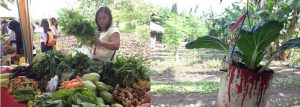DSWD encourages poor families to go ‘BIG’
News March 27, 2017, 0 Comment 0
Photo 1: A Pantawid Pamilya beneficiary prepares her crops, which are a product of Bio-Intensive Gardening (BIG), for display during the launching of the project at Barangay Ayala, Zamboanga City.
Photo 2: Container gardening was also introduced to the beneficiaries so those who do not have enough space in their backyard may still participate in the project.
To promote good health among poor families — especially those who are program beneficiaries — and to help them grow their own food, the Department of Social Welfare and Development (DSWD) encourages Filipinos to practice Bio-Intensive Gardening (BIG), a gardening technique that uses indigenous seeds and organic fertilizer to grow vegetables.
Last week, in Zamboanga City, DSWD-Field Office IX, introduced BIG to Pantawid Pamilyang Pilipino Program (4Ps) beneficiaries in the region. Bio-Intensive gardening is an organic agricultural system that focuses on achieving maximum yields from a minimum area of land, while simultaneously increasing biodiversity and sustaining the fertility of the soil. The goal of the method is long term sustainability on a closed system basis.
The field office launched the project at Barangay Ayala where DSWD beneficiaries from the community who have tried BIG showcased their communal and container gardens to their fellow grantees and other villagers.
Project ‘BIG’ is being implemented in partnership with the Office of the City Agriculture of Zamboanga, which provides regular training to DSWD beneficiaries on the basics of making organic soil and the techniques in planting vegetables.
The project involves the establishment of organic vegetable gardens within the community so the beneficiaries can grow their own food, helping them cut their daily expenses. Instead of spending money on groceries, families who will benefit from the project can focus on other expenses, such as utilities and house rental.
The project will also help address malnutrition among poor families, as it enables them to serve and eat healthy meals using the organic vegetables they grow themselves as ingredients.
In 2015, it was found out that more than 100 children in Brgy. Ayala were undernourished or did not have enough healthy food. In response to this, the Local Government Unit (LGU) of the barangay, together with the City Social Welfare and Development Office, the Nutrition and Barangay Inter-Agency Council (BIAC), and the DSWD, implemented a similar project, dubbed as “Jardin Na Mi Casa.”
DSWD Secretary Judy Taguiwalo expressed full support for the project and said that all beneficiaries of 4Ps and other DSWD programs should be encouraged to raise their own vegetables in their backyards. She said that even in the urban areas, people can plant vegetables in small plots of lands and even in pots. She said that it was very good that more and more DSWD beneficiaries are becoming empowered to provide for themselves and their families through their own efforts.
“With a little help from the DSWD, more and more of our kababayans are learning to fight poverty and becoming more conscious of good eating and nutrition habits. We want Project BIG to be replicated in all parts of the country, and not just among 4Ps beneficiaries but even among the beneficiaries of other programs, as well as partner civil society organizations,” she said.
The Pantawid program covers 41,605 barangays in all 144 cities and 1,483 municipalities in 80 provinces and 18 regions with a total of 4,385,344 households. Some 1,780, 444 or 39.07% are from Luzon; 891,537 or 20.33 are from the Visayas; and 1,713,363 or 39.07% are from Mindanao.
“Bio-intensive gardening may seem like a simple project, but it goes a long way towards eliminating hunger and food insecurity among our beneficiaries. It’s a very good effort towards reducing the impact of poverty on families,” the welfare chief said. #